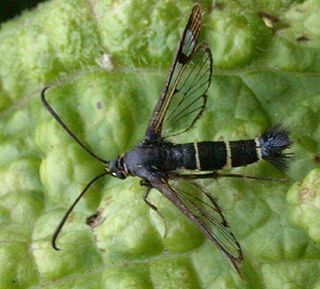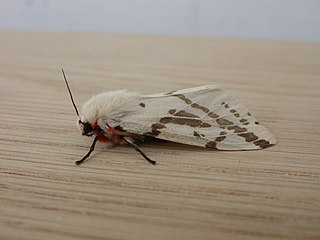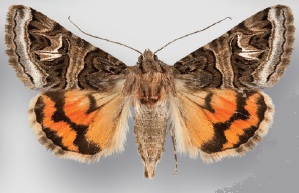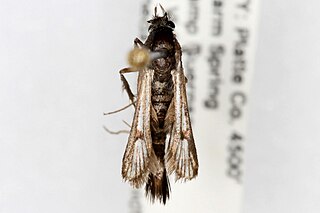
The Sesiidae or clearwing moths are a diurnal moth family in the order Lepidoptera known for their Batesian mimicry in both appearance and behaviour of various Hymenoptera.

Heliothis is a genus of moths in the family Noctuidae. It was first described by Ferdinand Ochsenheimer in 1816. Some of the species have larvae which are agricultural pests on crop species such as tobacco, cotton, soybean and pigeon pea. Some species originally in this genus have been moved to other genera, see Chloridea and Helicoverpa.

The grayish mouse opossum is a species of opossum endemic to Mexico. It is the sole species in the genus Tlacuatzin.

Lycomorpha is a genus of moths in the family Erebidae. The genus was erected by Thaddeus William Harris in 1839.

Ardices canescens, the dark-spotted tiger moth or light ermine moth, is a moth in the family Erebidae that is found across most of Australia. It originally was included in the genus Spilosoma, but later the generic status of Ardices was proven.

Spilosoma is a genus of moths in the family Erebidae originally described by John Curtis in 1825. A very heterogeneous group, it is in need of review by the scientific community, as certain species probably need reclassification into their own genera.
Diarsia is a genus of moths of the family Noctuidae.

Drasteria is a genus of moths in the family Erebidae.

Catocala miranda, the Miranda underwing, is a moth of the family Erebidae. The species was first described by Henry Edwards in 1881. It is found in the US from Illinois, Pennsylvania and Massachusetts to Florida and west to western North Carolina.
Drasteria inepta, the inept drasteria, is a moth of the family Erebidae. It is found from Arizona to Texas, north to Colorado and Utah.

Ambulyx canescens is a moth of the family Sphingidae first described by Francis Walker in 1865.

Zenodoxus is a genus of moths in the family Sesiidae.

Synanthedon is a genus of moths in the family Sesiidae.
Carmenta corni, the aster borer moth, is a moth of the family Sesiidae. It was described by Henry Edwards in 1881. It is known from North America, including Wisconsin.

Carmenta giliae is a moth of the family Sesiidae. It was described by Henry Edwards in 1881, and is found from western Alberta to north-western British Columbia, south to Arizona and New Mexico. The habitat consists of mid-to-high elevation montane meadows.
Carmenta texana, the Texana clearwing moth, is a moth of the family Sesiidae. It was described by Henry Edwards in 1881 and is known from the US states of Texas and Florida.

Carmenta verecunda is a moth of the family Sesiidae. It was described by Henry Edwards in 1881, and is known from the United States, including Colorado, Utah, California and Arizona.

Hesperopsis libya, the Mojave sootywing, Mohave sootywing, Great Basin sootywing or Lena sooty wing, is a butterfly of the family Hesperiidae. It is found in North America from eastern Oregon east to Montana and south to southern California, Arizona, and north-western Mexico including Baja California.
Arctia opulenta is a moth of the family Erebidae. It was described by Henry Edwards in 1881. It is found from Alaska through northern British Columbia to Labrador. The habitat consists of arctic tundra and alpine and subalpine tundra.

Aporophyla canescens is a moth of the family Noctuidae. It was described by Philogène Auguste Joseph Duponchel in 1826. It is found in Italy, Switzerland, Slovenia, Croatia, Albania, Bosnia and Herzegovina, Serbia, North Macedonia, Greece, Turkey, Israel, Portugal, Russia, as well as on Sardinia, Corsica, Sicily, Malta and Crete.














